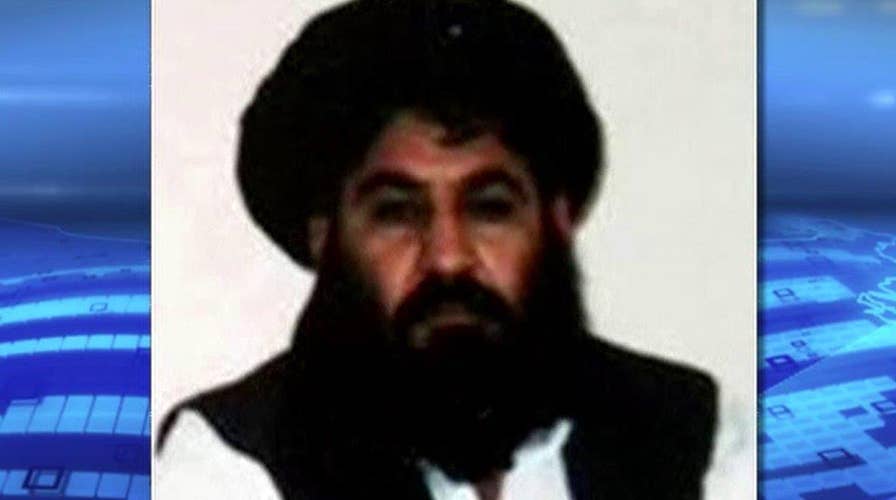US officials: Taliban leader Mullah Mansour 'likely' killed
Authorities say drone strike took place in remote region near the Afghanistan-Pakistan border
Afghan authorities confirmed Sunday that the leader of the Taliban, Mullah Mohammed Akhtar Mansour, was killed in a U.S. drone strike.
The National Directorate of Security said in a statement that Mansour was killed at 3:45 p.m. local time Saturday. The Associated Press, citing a statement from the spy agency, said the attack took place in Baluchistan province, in southwestern Pakistan.
"The attack happened on the main road while he was in his vehicle," the statement said.
Mullah Abdul Rauf, a senior Taliban commander, told the Associated Press earlier Sunday that Mansour was indeed killed in the drone strike.
A U.S. official told Fox News Saturday that Mansour was “likely” killed in the strike, while the White House is awaiting official confirmation of Mansour’s death before releasing their own statement about the strike.
President Obama authorized the strike in a remote area along the Pakistan-Afghanistan border. Mansour was traveling in a vehicle when the strike occurred. It was carried out my multiple unmanned aircraft operated by U.S. Special Operations Forces. Officials said there was no collateral damage in the aftermath of the strike. The official told Fox News Mansour was killed in a vehicle.
"Mansour killed American soldiers and thousands of Afghans. The world is a better place without him."
Secretary of State John Kerry praised Mansour’s death while on a visit to Myanmar. He also spoke about Mansour in the past-tense, even though the White House hasn’t officially confirmed Mansour’s death.
"Mansour posed a continuing imminent threat to U.S. personnel in Afghanistan, Afghan civilians, Afghan security forces and members of Resolute Support," Kerry said. "Peace is what we want. Mansour was a threat to that effort."
Kerry called for a post-Mansour Taliban to engage in serious peace negotiations with the Kabul government, saying, "It is time for Afghans to stop fighting and to start building a real future together."
The official declined to say if Pakistan gave the US military permission to strike.
Mansour was not listed on the State Department's Rewards for Justice list, a placement reserved for America's top enemies.
However, there was a $10 million bounty on the head of previous Taliban leader Mullah Omar, who was pronounced dead by the Afghan government in 2015 and reportedly died in 2013 in Pakistan.
Mullah Omar had sheltered Osama Bin Laden in Afghanistan.
The Taliban and Al Qaeda have "worked closely" at times, a US general tells Fox News. But, they are not categorized as a foreign terrorist organization as defined by the State Department.
Members of Congress lauded the attack. One lawmaker said Mansour's death, if confirmed, would be a significant blow to the Taliban, though not be enough to allow the U.S. to disengage from a conflict that has involved thousands of U.S. troops for nearly 15 years.
"We must remain vigilant and well-resourced in the field, and must continue to help create the conditions for a political solution," said Rep. Adam Schiff of California, top Democrat on the House Intelligence Committee.
Senate Armed Services Committee Chairman John McCain, R-Ariz., said he was glad Mansour "has met his just end" but urged stepped up coalition attacks on the Taliban.
"Our troops are in Afghanistan today for the same reason they deployed there in 2001 — to prevent Afghanistan from becoming a safe haven for global terrorists," McCain said.
Mansour was chosen to take the helm of the Afghan Taliban last summer after Omar's death became public. Omar's longtime deputy, Mansour had actually been the Taliban's de facto leader for years, according to the Afghan government.
His formal ascension was divisive in the Taliban, handing him the challenge of uniting a fractured — but still lethal — insurgency that has seen fighters desert for more extreme groups such as the Islamic State.
The Taliban ruled Afghanistan according to a harsh interpretation of Islamic law until the group was toppled by a U.S.-led invasion following the Sept. 11, 2001, attacks.
Almost 15 years later, there are about 13,000 troops in the country from a U.S.-NATO coalition, including around 9,800 Americans. While they are mostly focused on training and helping Afghan government forces battle the insurgency, about 3,000 of them are conducting counterterrorism operations against the Taliban and the extremist groups Al Qaeda and Islamic State.
They have increased their ranks by 20 percent since 2009, and have taken over Helmand Province. A bumper poppy crop and opium harvest there last month ensured the Taliban have renewed a major revenue source according to officials.
Fox News’ Lucas Tomlinson and the Associated Press contributed to this report.

